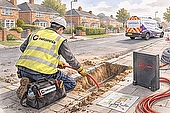Home > Broadband > News > Ofcom brings broadband providers up to speed
Ofcom brings broadband providers up to speed
BROADBAND customers will be allowed to cancel their contracts at any time if their broadband speed is slower than promised under new rules.

At present, customers have to continue to put up with poor speeds once they're beyond the first three months of their contract, or pay what could be a high fee to move to another provider.
Now a strengthened version of Ofcom's Code of Practice [pdf] on broadband speeds, coming into effect in October this year, will allow customers to exit their contract at any time without penalty.
Quickly does it
For many people, ISPs become associated with two broadband speeds: the one they promise to provide, and the one their users actually get.
Now the industry regulator Ofcom has ruled that they must be the same.
And they've given people new rights to be released from their contract if their provider doesn't deliver the broadband speed they estimated at the time of sign up.
Problems with broadband speeds can be caused either by the provider or issues within a user's own home.
For example, a device might be set up incorrectly, wiring in the home could be damaged, the outside line connection damaged, or the provider's traffic management system could be operating inefficiently.
So the provider must have an opportunity to resolve an issue before a customer can sever their contract.
The new ruling is line with the Government's aim of making UK broadband quicker - they want 90% of UK households to have "superfast broadband" by the end of the year.
That may still be an ambitious target. Currently only one in three UK households receives speeds that fast even though the average UK broadband speed is now 22.8Mb, up from 18.7Mb in May 2014 - at 4.1Mb, the largest absolute rise in broadband speeds Ofcom has recorded.
How slow can it go?
As well as pushing for faster, more reliable, speeds the new Code insists people must be better informed before they buy.
Providers are already obliged to provide customers with estimated line speeds before they buy. Salesmen are trained to explain exactly what customers will require to get those speeds. They even advise people if there are limits on the service to be provided and how performance may suffer.
However, at present, they normally advertise broadband at the headline speed. Under the new ruling they'll also have to display the minimum guaranteed access line speed (MGALS) too.
This is the speed for the bottom 10% of users on a similar service: for example, if there are 1,000 homes receiving broadband in a given area it's the 900th fastest that sets the MGALS.
Somewhat unambitiously, it's this speed that will be the benchmark: only if a customer's connection falls below that, and the provider cannot resolve it, will the customer be entitled to pack up and move providers without penalty.
Ofcom's six month review of contracts
Ofcom has simultaneously launched a six-month monitoring and assessment programme to address communication providers that make it hard for customers to cancel or switch.
Unfair cancellation and termination arrangements are a perennial problem that has required frequent Ofcom interference over recent years.
ISPs have been accused of creating obstacles for customers who want to exit their contracts without fuss. These include difficulties in securing the Portability Access Code (PAC) that people need to move to a new provider and long call waiting times when phoning up to try to cancel.
The problems are so widespread and complaints so numerous that Ofcom accuses providers of "systematically making it difficult" for customers to exit their contract.
Recent history makes it hard to predict what steps Ofcom will take next.
They have attempted to address fixed term telecoms contracts and problems with contracts that are automatically renewed before, and the regulators have also been criticised themselves for not doing enough by the Government before.
Changes are being introduced to make it easier for customers to switch too.
For those switching from one Openreach-reliant provider to another - anyone but Virgin, essentially - a single simple migration system is replacing the three currently in place.
All people will need to do to switch is give their new provider their existing telephone number and postcode. The rest of the details will be sorted out between the providers, old and new.
And ISPs won't be allowed to obstruct the process, or offer customers special offers or discounts when they want to switch.
Voluntary code of practice
Ofcom Codes of Practice are only voluntary and providers have a track record of sometimes failing to observe them.
New Ofcom chief executive Sharon White puts the delivery of first class communications firmly in the hands of the providers and says it's their "responsibility". Customers will be hoping that the ISPs agree.
However only time will tell if the communications industry will raise its levels sufficiently to meet Ofcom's preferred standards.
Receive consumer updates that matter in our newsletter

We are independent of all of the products and services we compare.

We order our comparison tables by price or feature and never by referral revenue.

We donate at least 5% of our profits to charity, and we aim to be climate positive.
Latest News

20 February 2026
Virgin Media complaints hit six-year low
18 February 2026
Virgin Media O2 owners to buy Netomnia parent in £2bn deal
18 February 2026
HBO Max UK launch confirmed for MarchReceive consumer updates that matter in our newsletter



Comments (1)